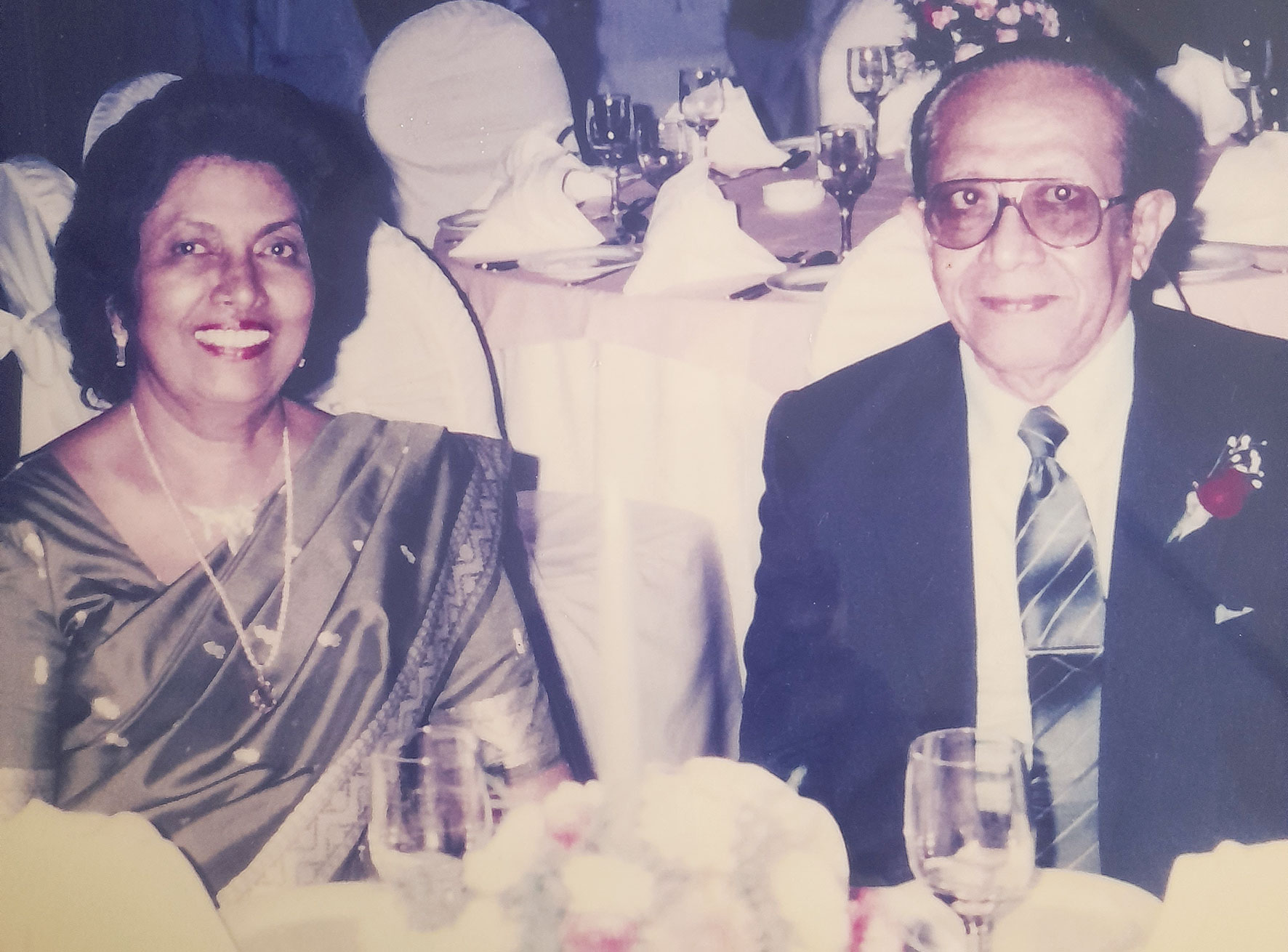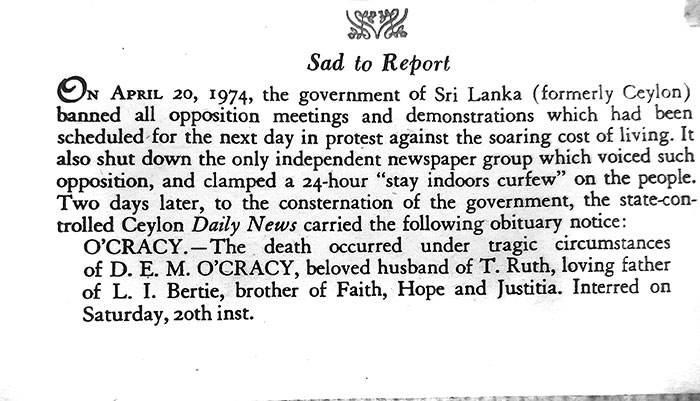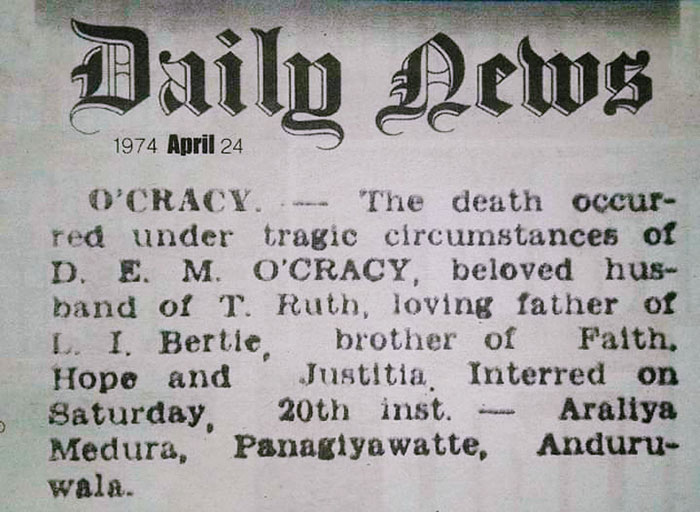FEATURES
D E M O’Cracy obituary notice 50 years on …..

Dr. and Mrs. Riley Fernando
by T. Ruth
(Rohan Fernando, son of Dr. Riley Fernando who was responsible for the prank, wrote this article)
The original D E M O’Cracy obituary was published in the State controlled Ceylon Daily News on April 24, 1974. It is relevant today as it was then 50 years ago.
Curbs on freedom of assembly and of thought and expression
Press censorship and curbs on freedom of assembly were a feature of the early and mid 1970’s. On April 20, 1974 the then United Front Government imposed a curfew to ban a series of islandwide protest meetings organized by the opposition. The Government sealed the offices of Independent Newspapers Ltd. (Sun/Dawasa group), which espoused the opposition view.
Protests by the people and efforts by the Government to curb such protests and moves to stifle the free expression of thought and speech are common phenomena today as they were in the early and mid 1970’s. Moves are afoot to pass legislation to control the use of social media (Online Safety Bill) and other legislation such as the Broadcasting Regulatory Commission Bill and of course the Anti-Terrorism Legislation keeps cropping up from time to time. All this legislation is designed to curb the free expression of thought and speech.
Political and economic scenario
There are both similarities and differences in the political and economic scenario that prevailed then and now. Foreign exchange shortages and import restrictions, rationing of food, price controls, ceiling on incomes and limits on property ownership were characteristic of the mid 1970’s. Today cost of living has spiraled to levels which are unprecedented. The high levels of taxation imposed upon on the citizenry makes life hard for many.
Rationing of essential commodities and import restrictions in early to mid 1970’s were prevalent due to socialist policies advocated by the then Minister of Finance Dr N M Perera. He was not prepared to accept the stringent conditions of the IMF. Instead he chose the route of austerity which meant ‘tightening of belts’ for the people. He believed that this was the way to avoid Sri Lanka becoming a bankrupt State. There were however no allegations of economic mismanagement that were leveled against him.
A recent Supreme Court judgment held that three Rajapaksa brothers and some of their advisors had breached the fundamental rights of the people by economic mismanagement resulting in Sri Lanka now being a bankrupt State unable to meet its debt obligations to creditors. Those found guilty of breaching fundamental rights of the people are still at large and worse still some are yet enjoying state patronage afforded to them in view of the positions held by them while the citizenry continue to suffer untold economic hardships.
Corruption
No effort is being made to pass legislation necessary for the recovery of stolen national assets. It is sad that the entire burden of the present economic crisis has to be borne by the populace and no action is being taken to take to task those responsible for corruption. In the early and mid 1970’s corruption was much less rampant than is the case at present.
The background and the ‘modus operandi’
Dr Riley Fernando the author of the D E M O’Cracy was a medical practitioner in Dehiwala. On April 21, 1974 the Government had imposed a curfew to ban mass protests which were to take place on that day. So he had no work in his medical clinic. It was towards evening that day that he got the brainwave to announce the death of democracy by way of an obituary notice.
The next day he went to Lake House and checked on the rates for obituary notices to be published in the Ceylon Daily News. He then sent the obituary notice by post with a money order to Lake House. On April 24, 1974 the most celebrated obituary notice in the history of our newspapers was published in the State run Ceylon Daily News causing roars of laughter from one end of the country to another!
It is believed that the number of copies of the Ceylon Daily News was an all-time record on that day! Everyone was clamoring for a copy of the Ceylon Daily News.
- Democracy Readers Digest
- Original advertisment
Suspects
There were many who were suspected of the authorship of this obituary notice. One was a well-known newspaper editor. His office was searched but it drew a blank. On the same day the obituary notice was published Dr Riley Fernando and his wife attended a social event at the residence of a fellow doctor. The general view among those present there was that there is no one in Sri Lanka who is capable of authoring such an obituary notice. It had to be the work of a foreign hand!
The day after the obituary notice appeared a friend of Dr Riley Fernando, also a fellow doctor whom he had known since his days at the Medical College, visited his home with his wife. His greeting was ‘Congratulations ! Your latest one is really superb!’ Dr Riley Fernando pretended to be dumbfounded. ‘Come on man’ the doctor went on ‘that obituary notice – of course I know that you did it’. He said ‘one has to have two qualities to do such a thing – firstly the wit and intelligence to think of it and secondly the courage to carry it through. You are the only person with both these qualities!’ he exclaimed.
Wreath of Red Roses
A wreath of red roses was delivered to Lake House with a note of sympathy from ‘T. H. E. Masses’. The delivery boy was arrested and interrogated by the Police. He was clueless and was later released.
Interdiction of employees at Lake House
Some employees of Lake House had been interdicted following the publication of this obituary notice. The training and upbringing that Dr Riley Fernando possessed was such that he could not bear to see innocent employees being reprimanded for something he had done. He was quick to write an anonymous letter to Hon Felix Dias Bandaranaike who was an important cabinet minister.
He was the Minister of Public Administration, Home Affairs, Local Government and Justice at the time. Dr Riley Fernando and Felix Dias Bandaranaike knew each other from the time they were in the kindergarten of Trinity College, Kandy. In his letter Dr Riley Fernando requested that the Lake House employees who have been interdicted be reinstated. Otherwise he said he would have no option to own up and face the consequences. The employees were reinstated immediately and the Police were instructed to call off all investigations.
In Parliament – O’Cracy is O’kay!
The subject of this obituary notice was discussed in Parliament on May 8, 1974 (Hansard pages 1686 – 1689) with an entire afternoon being taken up for discussion.One member said that ‘This fellow must be caught and skinned alive on Galle Face Green!’ members of the opposition demanded a debate on the issue.
Dr W Dahanayake the ebullient Member for Galle insisted on having his say about the death of democracy and had to be forcibly removed from the Chamber by the Sergeant-at-Arms for defying the Speaker’s orders asking him to sit down. Parliamentary sittings were suspended for five minutes in view of the resulting commotion.
Hon Felix Dias Bandaranaike treated the whole episode as a joke. He made a speech in Parliament. He said that he was away from Sri Lanka on the day on which the obituary notice had appeared but it was his habit to read the past newspapers following his return to acquaint himself of what had taken place when he was away. He said that he did so this time too following his return to Sri Lanka. He noted that a few of his friends had passed away during his sojourn overseas. One was an old Irishman named O’Cracy who had been living in Sri Lanka for many years.
He said that he immediately sent his security officer to the address given in the newspapers to check on the facts and offer his condolences. The security officer had returned saying that the whole thing was a hoax. He told me ‘There is absolutely nothing wrong with Mr O’Cracy. Not only that – all the members of his family are in good health – Mrs T Ruth and Mr L I Bertie and the rest of them’.
Hon Felix Dias Banadaranaike went on to say that in the past there were some occasions when Mr O’Cracy had some narrow escapes. One was when Dr W Dahanayake was Prime Minister when Mr O’Cracy had actually gone into hiding. Then in 1962, the Hon. Leader of the Opposition [Hon. J R Jayewardene] was stoutly defending persons who were in pursuit of Mr O’Cracy determined to destroy him.
In 1971, Mr O’Cracy was really in trouble. He nearly decided to go back to Ireland. He thought the insurgents there were safer than the ones here. Mr O’Cracy is extremely happy [now]. Apparently some of the wreaths which had been sent for his funeral had reached Lake House by mistake.
Dr Colvin R De Silva whose prose can be mellifluous or biting as the occasion demands it referred to the speech made by Hon Felix Dias Bandaranaike on the floor of the House that day as a ‘gem’.
The country mourns and the world sympathizes
There was reference to the D E M O’Cracy obituary notice in the international press. ‘The Hindu’ reported it on April 25, 1974. The ‘Daily Telegraph’ UK made reference to it on 26 April 1974. There were references to it in the media in several other countries too. The Reader’s Digest published it in the November 1974 issue. This perhaps is the only original contribution by a Sri Lankan to appear in the prestigious Reader’s Digest.
Dr Riley Fernando claims authorship of the obituary notice
Dr Riley Fernando left for the UK in 1976 two years following the publication of the D E M O’Cracy obituary notice in 1974. Following the General Election in 1977 there was a change in the Government. Following his return to Sri Lanka in December 1978 he decided to accept authorship for the prank that shook a Government. The receipt of a letter signed by L I Bertie took a Sunday Observer journalist to the Galle Road, Dehiwala, residence of Dr Riley Fernando to meet the man who announced the death of D E M O’Cracy.
In conclusion
Dr Riley Fernando entered his eternal rest in June 2003 at the age of 75 following a brain hemorrhage.The documents relating to the D E M O’Cracy obituary notice had been maintained meticulously by him as if he knew that they will be necessary to his son, author this article fifty years on.


